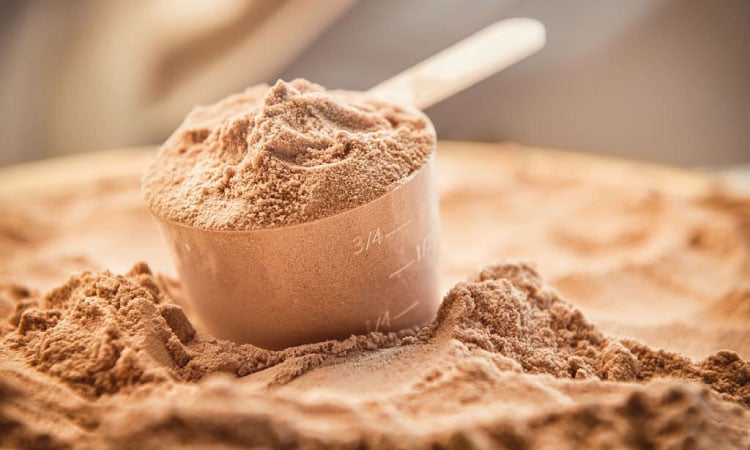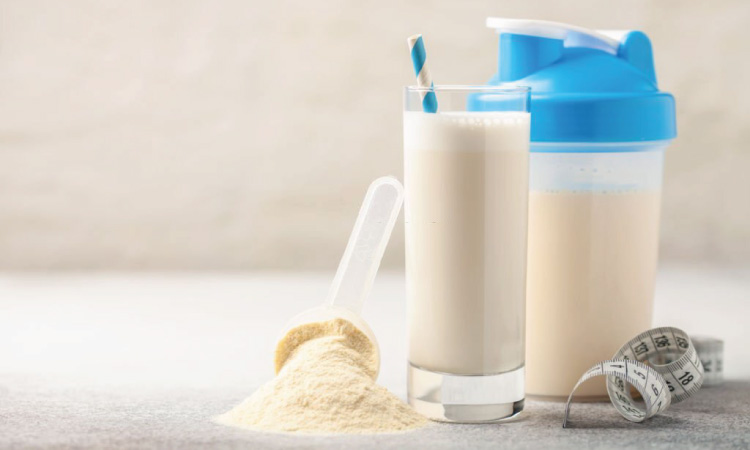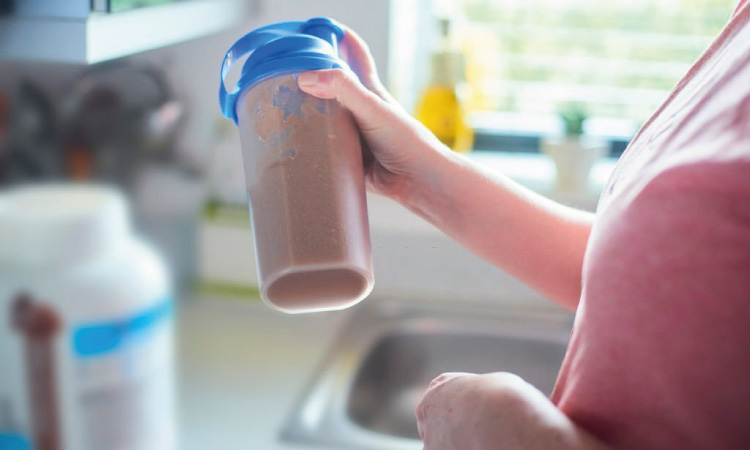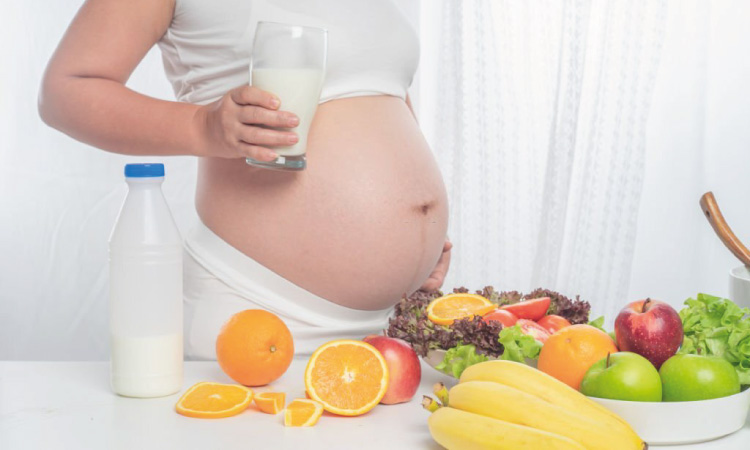Pregnant women require significantly more protein than when they are not pregnant. Protein plays an important role in building, maintaining, and repairing cells and organs, including the placenta during pregnancy. Pregnant women need protein for the healthy growth and development of their fetuses. These requirements can be met by a variety of protein rich food sources – both plant-based and animal-based. However, as individual protein needs increase during pregnancy, due to various reasons, many times, pregnant people can struggle to meet these higher needs. What can be done to meet these higher needs? Protein supplements have become increasingly popular in recent years. Does protein powder during pregnancy help to meet these higher needs?
What Is The Recommended Protein Intake For Pregnant Women?
Pregnant women need to eat about 70 to 100 grams of protein a day depending on their total body weight1. However, the standard protein requirements of a woman increase trimester-wise. It will be at its highest during the second and third trimesters when the baby is growing rapidly. A woman’s protein requirements are considered as per the ideal body weight for her height and not as per actual weight2.
A woman’s average protein requirements during each trimester are broken down as follows:
- The intake of protein for the first trimester should be 1.1-1.2 grams per kilogram of body weight
- The second trimester’s required protein intake is 1.5 – 1.8 grams per kilogram of body weight
- The amount of protein consumed per kilogram of body weight should increase to 1.8 – 2 grams during the third trimester
Note**: All of the above-mentioned values are based on the ideal body weight of the pregnant woman. Every woman’s nutritional requirements during pregnancy are different. Therefore, it is best to consult your doctor and a nutritionist to determine your exact requirements.
Related Reading: 21 Pregnancy Superfoods To Include In Your Pregnancy Diet
What Is Protein Powder?

Protein powders are powdered forms of protein that are derived from plants (rice, soybeans, hemp, peas, and potatoes), eggs, and milk (whey and casein protein). Taking this popular nutritional supplement can help increase protein intake daily.
Protein powder is sometimes flavored and blended with additional vitamins and nutrients. The protein powder may therefore contain added sugars, artificial flavors, vitamins, minerals, and even thickeners. A scoop of protein powder can have between 10 and 30 grams of protein.
Is It Safe To Consume Protein Powder During Pregnancy?
When a pregnant woman eats a variety of protein-rich foods every day, she probably doesn’t need protein powder at all. However, using a protein powder could be the only way some women can boost their protein content if they are protein deficient. Doctors will advise on the best and most appropriate protein powder to consume in such cases.
Calculate Due Date With LMP
Because protein powder supplements often contain artificial sweeteners such as sucralose, it cannot be said that they are completely safe for pregnant women. Also, too much protein during pregnancycarries its risks. Protein powder should not be self-prescribed during pregnancy.
Because most protein powders are composed of proteins such as whey, casein, and soy, pregnant women who are allergic to dairy products may opt for organic protein powders that are safe to consume during pregnancy. Your doctor can help you with this.
When to take protein powder during pregnancy, how much to take, and how to take it are best left to a medical professional. Often, doctors will prescribe a protein-rich diet or protein supplements to underweight women even before they are conceived.
What Are The Different Types Of Protein Powders?
Protein powders can be derived from dairy, eggs, rice, soybeans, or peas. Depending on the source, protein powders that are counted safe during pregnancy are listed below.
1. Whey and casein protein
Casein and whey are the two major proteins in milk. About 80% of milk proteins are casein and 20% are whey3. In contrast to many plant-based proteins, milk proteins contain all of the essential amino acids. Whey protein is the most common protein powder since it is easily digestible and easily soluble in water.
If you ask if whey protein powder during pregnancy is safe to consume, the answer is it is safe. In the same way that milk and cheese are safe, so are whey and casein proteins turned into powders. However, these protein powders are not suitable for pregnant women with lactose intolerance, as they are derived from milk.
Related Reading: 9 Types Of Cheeses To Avoid During Pregnancy
2. Egg protein powder
Lactose-intolerant pregnant women who need protein intake can opt for egg protein powder, a lactose-free product that contains approximately 80% protein. It contains all nine essential amino acids. Pregnant women who need to avoid complications due to excess weight gain during pregnancy will benefit from this protein powder. As this protein powder may be a little difficult to blend, it’s recommended to use equal parts of whey protein and egg white protein to make a protein shake. A rich source of choline, eggs are one of the best foods for pregnancy. This makes the protein powder a good choice for pregnant mothers to meet their nutritional requirements.
3. Pea protein powder
Pea protein powder is among the best types of protein powder for pregnant women, especially those who are vegetarians. It is made from legumes, yellow peas, and pulses. Its fiber content is high. Pea protein powder is packed with vital amino acids as well. Pea protein is a great choice for pregnant women who are sensitive to dairy products and eggs. Blending pea protein powder can be difficult. However, that is the one downside of being an all-plant protein.
Pregnant women can take pea protein without being concerned about its safety. Besides their nutritional value, they contain compounds that contribute to the growth of the fetus. For example, docosahexaenoic acid, which is found in pea protein, helps to develop fetal brains and retinas4.
4. Hemp protein powder
As far as protein powders go, hemp protein is one of the best. It is a 100% plant-based protein that is derived from a natural plant source. Hemp protein contains the least amount of protein when compared to whey, soy, and casein protein. Hemp protein is also not absorbed easily. On the bright side, hemp protein powder is highly fiber-rich. In addition, it contains minerals like zinc, iron, copper, and magnesium. Supplementing with hemp protein powder during pregnancy is very safe since it provides folic acid, omega-3s, and omega-6s, which are essential for the development of the fetus and the healthy progression of pregnancy5.
Note**: Though an excellent protein powder, soy protein powder is not included in this list since soy products, if exceeded the limit, could hamper the hormone estrogen, which is not safe during pregnancy.
Related Reading: Soy Milk During Pregnancy – Benefits, Risks And Precautions
How To Take Protein Powder During Pregnancy?

Combining protein powder with fats and carbohydrates will produce better results. Protein shakes and smoothies can be made with protein powder. Use ingredients like milk, yogurt, oats, peanut butter, banana, blueberries, and avocado to enhance taste and increase the nutritional value. Additionally, protein powder can be mixed into homemade desserts, soups, and oatmeal.
How Does Too Much Protein Affect Pregnancy?
Too much protein during pregnancy has its own set of risks.
- The consumption of high-protein supplements during pregnancy was significantly linked to small-for-gestational-age babies6
- Diets high in protein and low in carbohydrates increased gestational diabetes risk in pregnant women7
What Makes Protein Powder Unsafe For Pregnant Women?
Protein powder is a popular protein source. Women’s protein requirements rise during pregnancy. Protein powder is still unsuitable for pregnant women for a few reasons. Here are some of the factors that make protein powder unsafe for pregnant women.
1. Excessive caffeine and vitamin content
Caffeine is often added to protein powders by many brands to make them taste better. They also fortify them with excess minerals and vitamins to make the product more appealing. Such brands should be avoided by pregnant women because caffeine and too much vitamin intake during pregnancy are risky. Prenatal multivitamins are likely already in the pregnant woman’s regimen. Overdoing nutrients isn’t recommended during pregnancy.
2. Contains flavoring and filling agents
Most protein powder brands contain fillers and flavoring agents that lack any nutritional value, and they may not always be as natural as they claim to be. Their purpose is just to make protein shakes taste better or add bulk to them. Thus, do not consume protein powders containing fillers or flavorings during pregnancy.
3. Artificial sweeteners may be present
It is difficult to find a protein powder without artificial sweeteners, thus one should know everything about artificial sweeteners during pregnancy. Artificial sweeteners are used in many popular protein powders to provide taste as well as maintain a low-calorie count. The two most popular artificial sweeteners in protein powders are sucralose and acesulfame potassium. Due to its inability to cross the placenta, sucrose is safe during pregnancy. Acesulfame potassium crosses the placenta, despite no scientific evidence of adverse effects. On the other hand, artificial sweeteners like saccharin, aspartame, etc., cross the placenta, affect fetal development, and should not be consumed by pregnant women8.
4. Source of powder matters
Any food you consume during pregnancy will be passed to your child in one form or another. Protein powder sources are extremely important, thus it is imperative to investigate them carefully. Make sure the powder is produced without pesticides, chemicals, or hormones by checking its manufacturer and production methods. Plant-based protein is best when it’s organic, and keep in mind that you can always trace the source of a good brand.
5. Keep an eye on the ingredients
Nowadays, many products come with warning labels if they contain ingredients that may be harmful to pregnant or breastfeeding women or children. This also applies to protein powders. You can choose safe powders based on their labels. However, not all powders have them. Hence, it is always wise to read the ingredients and find out whether they are suitable or not.
5. Avoid herb-based protein powders
A lot of protein powders come in “green” or “superfood” blends, which typically contain a variety of herb-based powders. The fact is that numerous herbs haven’t been proven safe during pregnancy. Supplements and powders containing herbs should be limited or avoided during pregnancy.
Related Reading: 12 Signs Of Healthy Baby In Womb- Trimester Wise
What Are The Benefits Of Protein Powder During Pregnancy?

Protein powder is not always a safe choice during pregnancy. In spite of this, some pregnant women may need to take protein powder as directed by their doctors for a variety of health reasons. Below are some benefits of taking protein powder while pregnant.
- As protein powder helps fill the stomach up, it helps curb hunger pangs during pregnancy. This in turn helps to maintain healthy weight gain throughout the pregnancy
- Women who are pregnant and suffer from morning sickness or dizziness can benefit from protein powder
- Helps to regulate metabolism
- Contributes to the development of the fetus
- Improves the health of underweight mothers
Alternate Sources Of Protein For Pregnant Women
Protein can be obtained in a variety of ways during pregnancy. A healthy diet can provide enough protein. Some of the sources of protein include:
- Eggs
- Nuts and seeds
- Beans and legumes
- Quinoa
- Meat – Opt for lean meat and poultry like chicken, and duck rich sources of protein and low in fat
- Fishes like salmon
- Seafood – Crabs, prawns, fish, lobster, mussels, oysters, and clams
- Greek Yogurt
- Dairy – milk, yogurt, cheese
- Peanut butter
Remember not to overdo it on proteins and miss out on other essential micro and macronutrients. Both are crucial to the development of your fetus during pregnancy.
Precautions And Safety Tips For Consuming Protein Powder During Pregnancy
Protein powders that contain no artificial flavors, colors, or no added vitamins are usually safe to consume. However, they should only be consumed after confirming that you are not allergic to the protein source.
There are a number of brands that use natural colorings and flavors. You can meet your protein needs, without worrying about side effects, by identifying such brands. You can always make your protein powder if you don’t want to buy it from the market. In fact, homemade protein powder is best.
Homemade protein powder for pregnancy
It is very simple to prepare home-made protein powder. All you need are:
- Almonds: one cup
- Oats: half cup
- Walnuts, pistachios, and cashews: ¼ cup each
- Seeds- pumpkin, chia, melon, and sunflower: two tablespoons each
- Unsweetened milk powder: half cup
Directions
Dry roast 1 cup of almonds until they become aromatic. Put them aside. In the same pan roast walnuts, pistachios, and cashews. Turn off the heat when the nuts are crunchy. Set it aside. Now, start roasting pumpkin seeds, melon seeds, and sunflower seeds. Continue roasting until the seeds are crunchy and set aside. The oats can now be roasted until they become crispy. Combine all the roasted ingredients in a bowl and add the chia seeds. Mix well so that everything is combined well.
As soon as the ingredients are cooled, put them in a blender and blend until they are finely ground. Ensure that the oil isn’t released by pulsing and blending. Sieve the powder. Stir in the milk powder. Your homemade protein powder for pregnancy is ready. Store in an airtight container and use within two months.
Conclusion

Pregnant women require significantly more protein than usual. All of these requirements can be met by a variety of food sources. Pregnant women must rely on both plant-based and animal-based sources. However, if you are vegan or vegetarian, or due to some other reason, you cannot meet your protein requirements through diet alone, you can consider taking protein powder. We hope now you have a better idea of what to look for when choosing a protein powder during pregnancy. Just don’t start taking it without consulting your doctor first. Pregnancy is one of the most delicate times in a woman’s life. One mistake can put it at risk.

